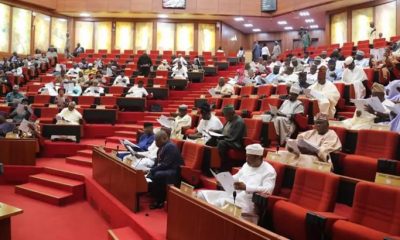Business
Stakeholders, Professionals objected ICAN amendment bill seeking to take over tax regulation at Senate public hearing

The proposed amendment bill of the Institute of Chartered Accountants of Nigeria, ICAN ran into troubled waters on Thursday at a public hearing of the Senate Committee on establishment and Public Services as major stakeholders in financial sector accused ICAN of attempting to take over their responsibilities.
ICAN was seeking amendment of Act No. 15 of 1965 and for other matters connected thereto.
Some stakeholders and professionals that vehemently opposed to the proposed amendment are Chartered Institute of Taxation (CITN), the Association of Nigeria Taxation Students (ANTAS), the Chartered Institute of Treasury Management (CITM) and the Nigeria Deposit insurance Corporation (NDIC).
According to them, ICAN was using the amendment to take over their professions.
The 16th President of the CITN, Barrister Samuel Agbefuyi said, the opinion is the same among all the stakeholders that came except ICAN.
“Everybody should maintain its lane, if you are an accountant, I am one that knows what it means to be a tax practitioner. If you talk about tax practice I am one, if you talk of a lawyer I am one, if you talk of a stock broker I am one. So I know what it is to be all these. You can not use one legislation to override other professional bodies in the society that is our message.”
He said there is nothing wrong with the amendment but you can not use this amendment to annex other professional bodies.
“They have right to do their internal control and internal coperate governance but you can not use that to annex the profession that has been certified by the National Assembly.”
The National President of ANTAS, Babtunde Opeyemi in his presentation expressed strong concern regarding sections 21 and 28 of the ICAN Act Amendment Bill 2024 (SB265).
“Section 21 of the Bill introduces a new provision to the Principal Act, allowing Chartered Accountants to practice as Tax Practitioners. Section 28 expands the definition of “Accountancy practice” to include tax practice.
According to him their objections he said is the dual regulation granting ICAN authority over both accounting and taxation regulation which he said risks overlap and confusion.
“Currently, the Chartered Institute of Taxation of Nigeria (CITN) oversees tax practitioners, ensuring competence and ethical standards. Introducing ICAN as a second regulatory body for taxation could create inefficiencies and uncertainties both for tax professionals, tax payers and students who in no distance time doubles as both the former and the latter.
Explaining further he indicated that Taxation demands specialized knowledge beyond general accounting principles, as it requires a holistic training of the practitioner on both the legal and ethical demands of the job and CITN has over the years mastered the game.
“ANTAS accommodates students from diverse backgrounds including Law, Marketing, Finance, Economics among others, highlighting the interdisciplinary nature of tax practice.
“Allowing ICAN to regulate taxation may undermine the specialization necessary for effective tax practice.
On the Legal Implications he said the proposed amendment may lead to legal disputes.
“Past conflicts between ICAN and CITN, such as the ICAN vs CITN case (Appeal No. SC. 492/2013), demonstrate the potential for legal entanglements. Expanding ICAN’s regulatory powers into taxation could exacerbate such conflicts.
“To Avoid Conflict of Interest and ensure Professional Independence it is imperative that ICAN does not regulate both accounting and taxation.
“A single body regulating both areas could compromise the objectivity and impartiality required in these fields. Ensuring that CITN remains the sole regulatory body for taxation helps maintain clear boundaries and prevents any potential conflicts of interest, thereby upholding the integrity and independence of tax practitioners.
Continuing he said, taxation is not merely an extension of accountancy; it encompasses elements of law, economics, finance, and public policy.
“CITN’s training and certification processes are specifically designed to address this complexity and breadth. Allowing a body like ICAN, which primarily focuses on accounting, to oversee taxation could dilute the specialized expertise that CITN provides, ultimately compromising the quality and effectiveness of tax practice in Nigeria.
He urged the National Assembly to reconsider sections 21 and 28 of the ICAN Act Amendment Bill and exclude all Tax related phrases therein.
Allowing ICAN to regulate taxation risks diluting specialization, fostering legal disputes, and confusing practitioners and students.
“We recommend maintaining the current regulatory framework, with CITN independently overseeing tax practice. ANTAS encourages dialogue and collaboration to ensure effective and efficient regulation within the Nigerian taxation landscape.
The Registrar and chief executive of CITN Adedoyin Olumide raised concern about the proposed amendments to the ICAN Act 1965 about its overreach and conflicts with the domains of other professional bodies.
“While ICAN’s efforts to modernize are commendable, the bill’s extensive scope could disrupt the professional ecosystem and lead to regulatory conflicts.























